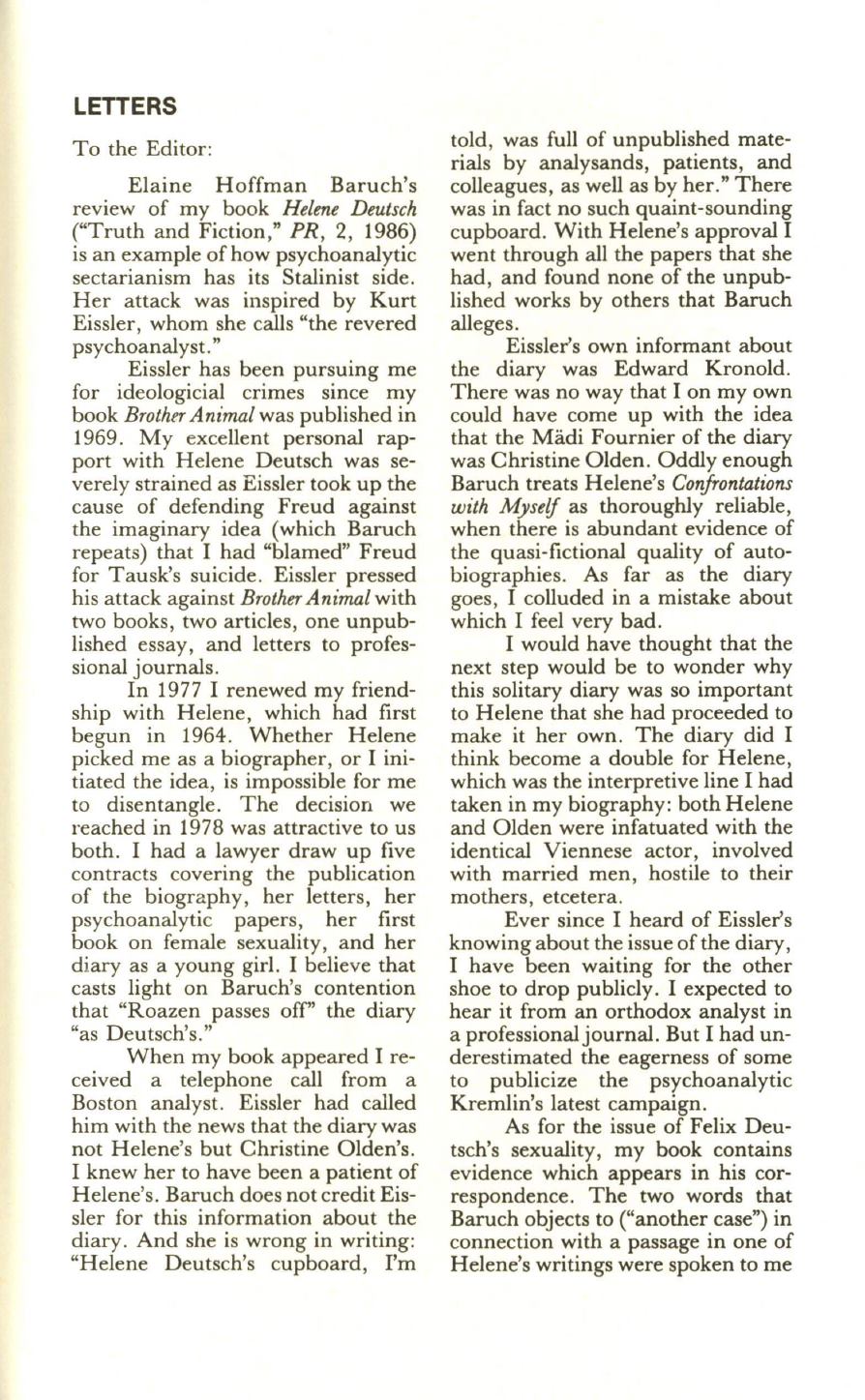
LETTERS
To the Editor:
Elaine Hoffman Baruch's
review of my book
Helene Deutsch
("Truth and Fiction ,"
PR,
2, 1986)
is an example of how psychoanalytic
sectarianism has its Stalinist side.
H er attack was inspired by Kurt
Eissler, whom she calls "the revered
psychoanalyst."
Eissler has been pursuing me
for ideologicial crimes since my
book
BrotherAnimal
was published in
1969. My excellent personal rap–
port with Helene Deutsch was se–
verely strained as Eissler took up the
cause of defending Freud against
the imaginary idea (which Baruch
repeats) that I had "blamed" Freud
for Tausk's suicide. Eissler pressed
his attack against
Brother Animal
with
two books, two articles, one unpub–
lished essay, and letters to profes–
sional journals.
In 1977 I renewed my friend–
ship with Helene, which had first
begun in 1964. Whether Helene
picked me as a biographer, or I ini–
tiated the idea, is impossible for me
to disentangle . The decision we
reached in 1978 was attractive to us
both . I had a lawyer draw up five
contracts covering the publication
of the biography, her letters, her
psychoanalytic papers, her first
book on female sexuality, and her
diary as a young girl. I believe that
casts light on Baruch's contention
that "Roazen passes off' the diary
"as Deutsch's ."
When my book appeared I re–
ceived a telephone call from a
Boston analyst. Eissler had called
him with the news that the diary was
not Helene's but Christine Olden's .
I knew her to have been a patient of
Helene's. Baruch does not credit Eis–
sler for this information about the
diary. And she is wrong in writing:
"Helene Deutsch's cupboard, I'm
told, was full of unpublished mate–
rials by analysands, patients, and
colleagues, as well as by her." There
was in fact no such quaint-sounding
cupboard. With Helene's approval I
went through all the papers that she
had, and found none of the unpub–
lished works by others that Baruch
alleges.
Eissler's own informant about
the diary was Edward Kronold.
There was no way that I on my own
could have come up with the idea
that the Miidi Fournier of the diary
was Christine Olden . Oddly enough
Baruch treats Helene's
Confrontations
with Myself
as thoroughly reliable,
when there is abundant evidence of
the quasi-fictional quality of auto–
biographies. As far as the diary
goes, I colluded in a mistake about
which I feel very bad.
I would have thought that the
next step would be to wonder why
this solitary diary was so important
to Helene that she had proceeded to
make it her own. The diary did I
think become a double for Helene,
which was the interpretive line I had
taken in my biography: both Helene
and Olden were infatuated with the
identical Viennese actor, involved
with married men , hostile to their
mothers, etcetera.
Ever since I heard of Eissler's
knowing about the issue of the diary,
I have been waiting for the other
shoe to drop publicly. I expected to
hear it from an orthodox analyst in
a professional journal. But I had un–
derestimated the eagerness of some
to publicize the psychoanalytic
Kremlin's latest campaign.
As for the issue of Felix Deu–
tsch's sexuality, my book contains
evidence which appears in his cor–
respondence. The two words that
Baruch objects to ("another case") in
connection with a passage in one of
Helene's writings were spoken to me


